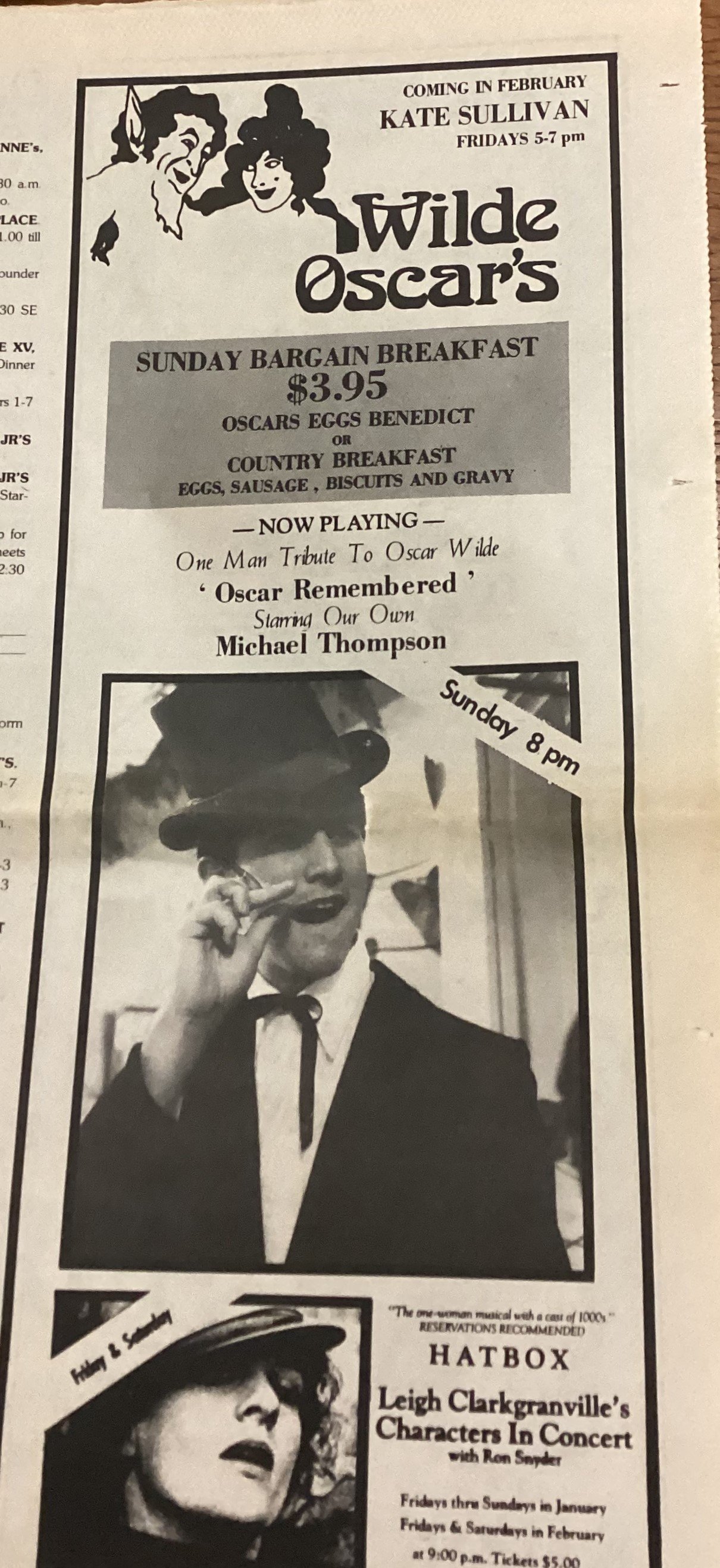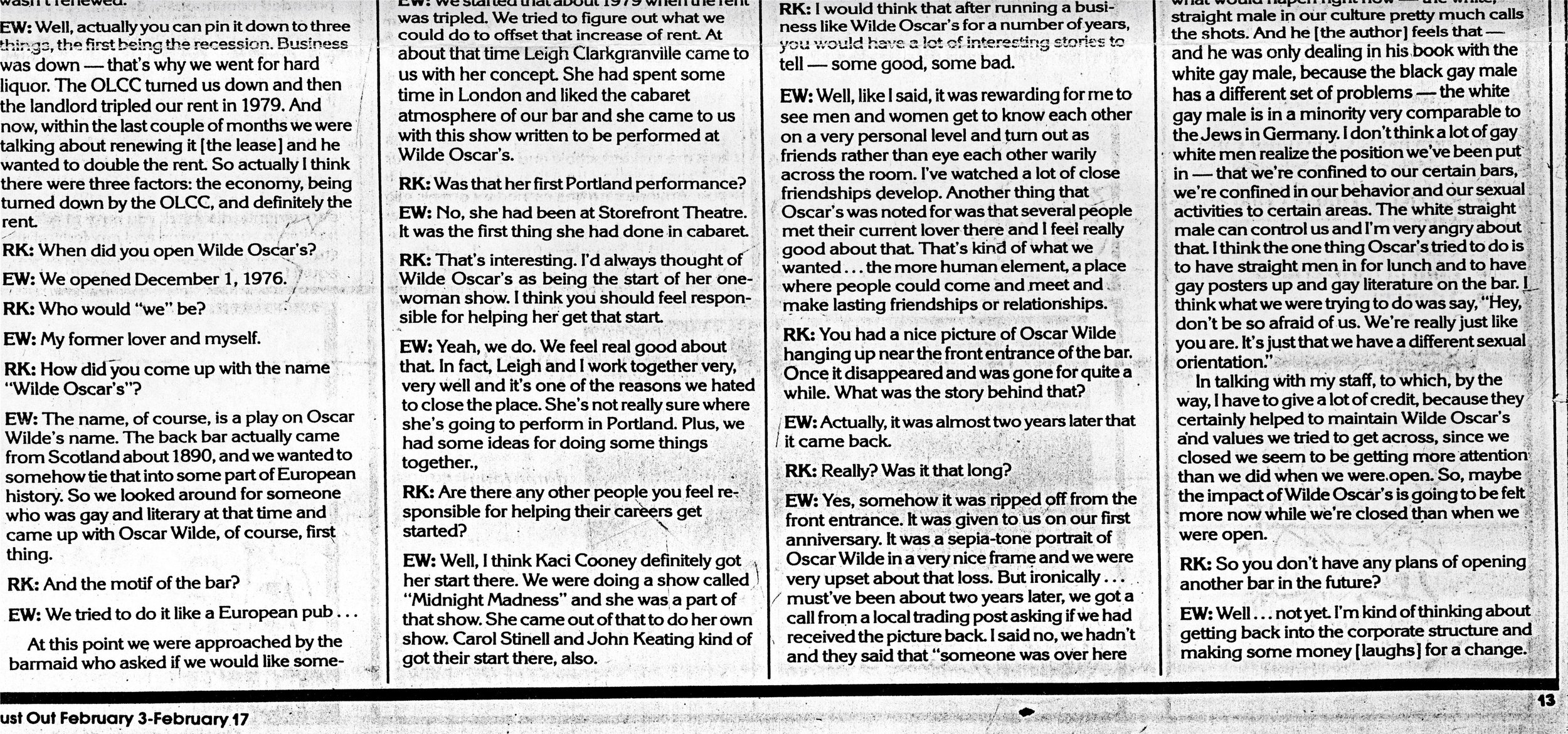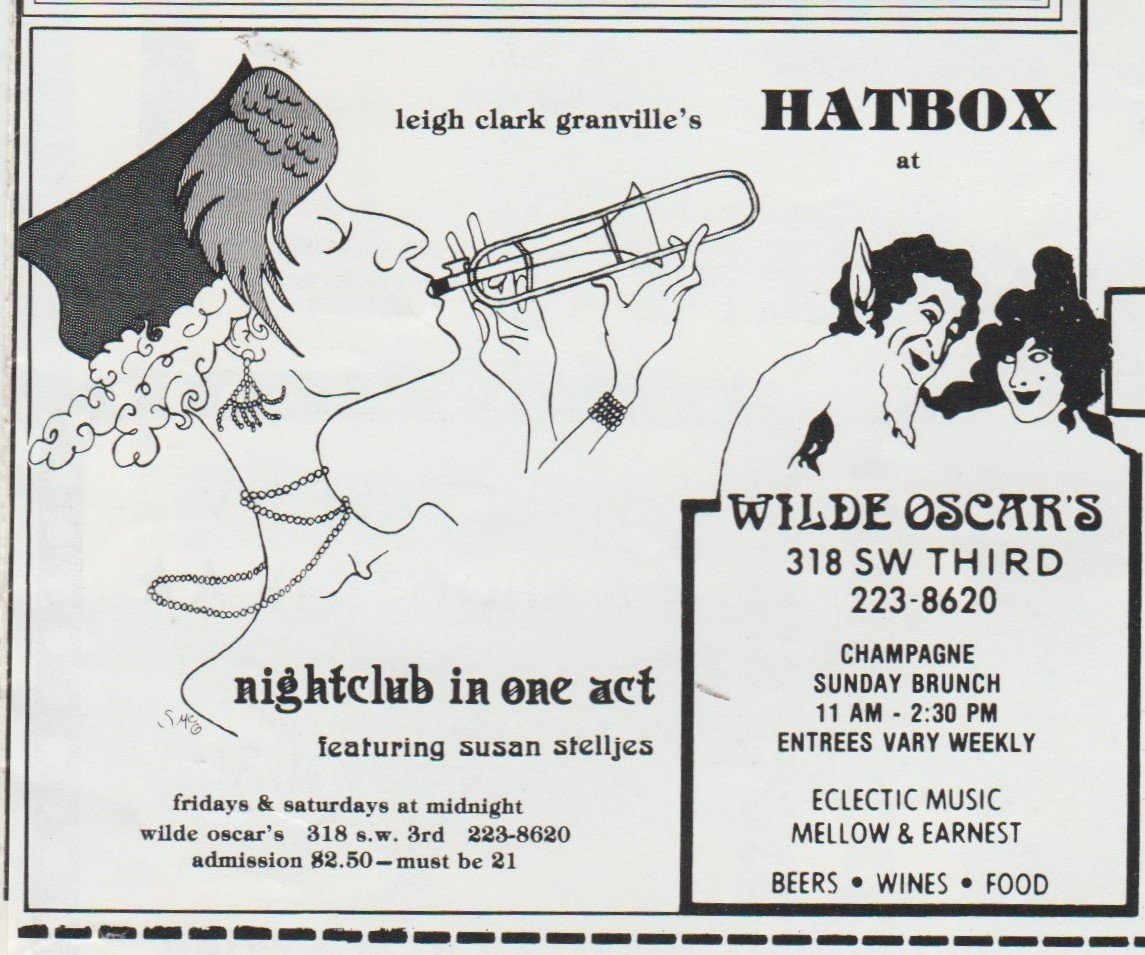Bars, Restaurants, & Taverns
WILD OSCAR’S
Per papers called Chronology of Portland’s Gay Bars – author unknown, “12-1-1976-1983. Closed due to high rent; mixed gay and lesbian, featured cabaret and ‘open mike” acts.
It became a gay bar with a social conscience when opened by Early Wright in December 1, 1976. It had a European-style ambiance featuring cabaret and musical shows that appealed to lesbians and gay men alike. Hanging near the front entrance of the bar was a large picture of Oscar Wilde, that suddenly disappeared one day and eventually reappeared two years later in Tillamook. This was definitely NOT a cruise bar, and it may have suffered because of it. According to Wright, inability to pay an increased rent, a declining trade, and the fact that the OLCC turned down his application for a liquor license all contributed to the establishment’s demise. Nevertheless, it left an impact on the community—having served as the meeting place for a number of community groups including: Gay Men Together, Oregon Fair Share, and a William Temple House counseling group.
Per the GLAPN - A Walking Tour of Downtown Portland: A Century of Gay, Lesbian and Transgender Historic Sites June 1999: (1976-1983) Previously known as the Filling Station Tavern and the Chrystal Pistol. It became a gay bar with a social conscience when opened by Earl Wright in December 1976. It featured a European-style ambiance, featuring cabaret and musical shows that appealed to lesbians and gay men alike. Hanging near the front entrance of the bar was a large picture of Oscar Wilde, that suddenly disappeared one day, and eventually reappeared two years later in Tillamook. This was definitely NOT a cruise bar, and it may have suffered because of it. According to Wright, unable to pay an increased rent, a declining trade, and the fact that the OLCC turned down his application for liquor license all contributed to the establishment’s demise. Nevertheless, it left an impact on the community-having served as the meeting place for a number of community groups including Gay Men Together, Oregon Fair Share, and a William Temple House counseling group.
NOVEMBER 1976 ad in Northwest Gay Review page 21 states NEW Wilde Oscar’s; also in Visitor's Guide Portland, Wilde Oscar’s is shown as a bar.
The play, Duck Variations was produced at Wilde Oscars December 1, 1976. [per interview Just Out Feb 3, 1984] -1983 located at 318 S.W. Third]. Per an email with Steve Maker, “I think they asked us. It was a good venue for the space and script.”]
Per interview in Just Out February 3-17, 1979 by Rupert Kinnard “Wilde Oscar’s – the demise of an institution” - Rupert met owner Earl Wright at Elephant & Castle to discuss the closing, “RK: I’m interested in a couple of things There are basically two rumors as to why Wilde Oscar’s closed. One is that the OLCCI didn’t approve the liquor license for which you applied and the other that your lease wasn’t renewed. EW: Well, actually you can pin it down to three: the first being the recession. Business was down that's why we went for hard liquor. The OLCC turned us down and then the landlord tripled our rent in 1979.”
Per inteview in Just Out February 3-17, 1979 by Rupert Kinnard “Wilde Oscar’s – the demise of an institution” - Rupert met owner Earl Wright at Elephant & Castle to discuss the closing, “RK:I’m interested in a couple of things There are bascialy two rumors as why Wilde Oscar’s closed. One is that the OLCC didn’t approve the liquor license for which you applied and the other that your lease wasn’t renewed. EW: Well, actually you can pin it down to three: the first being the recession. Business was down-that’s why we went for hard liquor. The OLCC turned us down and then landlord tripled our rent in 1979.”
An article in the Cascade Voice, February 3, 1984, page 15 under RECESSION OR RECOVERY? By Robert Paul Dunn Just four years ago July 3rd Darrel and David opened a new bar to the gay community, the Hunt Pub. “Somebody’s had by then given us the first clean and respectable bar and they thought that there had been a banker for 12 years and gave up that career to begin the bar. They hoped to invest the profits in rental units for gays and were aiming at a gentlemen’s bar. It seems that the Hunt Pub, along the way, has been a lot of things other than that, including drag, leather, women, and is now about 50-50 men and women setting in comfortably together.
Darrel says that as the business took more and more of their money, they realized their goals would have to be changed. The bar took more and more of their time, too, and their relationship suffered. As they tried to produce a clean bar with the best product available for the dollar, they learned a lot about the community, the court system, organizations, individuals who work in and for the community and other bar owners (with many of whom they have become personal friends). They created employment and the business within their community and city of Portland at large.
Finally, it became a choice between keeping their business or keeping their relationship together. They reluctantly decided to let the business go. Their dreams and hopes did not seem to be feasible in reality…has maintained them in his home. [continuing in the article] The bar has experienced many changes over the 3 ½ years. Now the sale of the Hunt Pub to Mark Lohr marks the last change Darrel and David will oversee. [part of a larger article]
Interesting portion of the article is: The spring and summer of 1981 saw many changes in Portland’s bar scene. Soon after the Hunt Pub came CC Slaughter’s and Somebody’s and the Embers moved into even better locations; then Ray’s Ordinary Bar and Grille followed. Even Roxy Hearts became gay again. [further I the article] Earl from Wilde Oscar’s had several reasons for locking the doors and calling in an independent company to dismantle and sell the fixtures. In 1979 he experienced a 300% raise in his rent, and then in 1983 the landlord would allow him a $1,250 month to month lease or a $2,100 monthly sum on a five-year lease. After his extensive and expensive attempt to meet OLCC requirements for a liquor license (which in the end refused for arbitrary reasons at best), Earl decided to quit, not sell, the business. [further in the article] The economic depression of the Pacific Northwest has echoed through every segment of the urban countryside without prejudice. And gays, who for ages he been assigned the dubious honor of having “disposable income” find biting many of the same bullets that have long been the diet of the straights, instead of eating out and going out for entertainment Most of our disposable income is time.
Businesses that have changed name and ownership and/or address: Bushes to Stark Street Station to Floosies; Hamburger Mary’s East to Dugan’s; Black Hawk to JOQ’s; Jelly Bean to The Store; [wrong, the card show was called The Store, The Jelly Bean was a clothing store, but because people came in and said Hi Jelly Bean, Jeanie changed it all to Jelly Bean] Rhondee to C C Slaughter’s; Embers Rafters to Embers/Avenue; Somebody’s Place; Roxy Hearts; Hunt Pub; Dudley’s Record Pool to Portland DJ Ass and Chuckles to 1810 NW Lovejoy
Business that have closed: Dahl & Penne; J & J; Grand Oasis; The Half Moon Tavern; Wilde Oscar’s; The 214; Paparazzi; Fickle Fox; Into Leather; Skinners; Lion Pride; Hot Potata Café; Mildred’s Palace [Mildred’s Palace moved and with that move, the name changed to The City Night Club]; Players, The Helm.
Businesses that are new: Forward Gear; JR’s West, JR’s Cell; Ray’s Ordinary Bar & Grille
Per paper written by Mario Aguilar for the Gay & Lesbian Archives December 7, 2000, per an interview with Earl W Wright – the owner of Wilde Oscar’s.
In 1975 Earl L. Wright and his partner Jim opened the tavern Wilde Oscars in downtown Portland, Oregon. [not true, it opened in 1976] Located at 318 SW 3rd Avenue, it was a few blocks away from Stark Street where most of the gay bars were located (where currently all of the major Gay bars in Portland located-with the exception of Ember’s and The Egyptian Room). The origin of Wilde Oscar’s begins in September 1975. Earl L. Wright had once worked for Sears but was forced to leave and afterwards went on a three-month sabbatical with his lover Jim to Europe. When they returned they looked for things to do.
They had thought about opening a bookstore (like “In Other Words” or “Powell’s) but were unsure of what exactly they wanted to do. Bookstores are difficult even today as businesses. While looking for something to try Jim and Earl had decided to see what they weren’t too Impressie bars around to bring to see what they could do about it. They searched for a location and found a bar (Earl thinks it was called “The Gasoline Pump) [it was called the Filling Station until 1975, then for a short time Cyrstal Pistal Tavern) which was a straight bar that was going out of business. They bought it and because of the back bar (such bars came about at the turn of the century), they decided to name the place after Oscar Wilde. They inverted ‘the name of the famous writer and literary genius and named the place Wilde Oscar’s (who lived around the turn of the century).
They both wanted a business and it just seemed to present itself. They wanted a theme in honor of Oscar Wilde. Every booth had a picture of Oscar Wilde and food items were given names inspired by characters in his plays. Wilde Oscar’s began as a restaurant/tavern and eventually evolved into a bar that had live entertainment and rotating art shows, which were a lot the art shows we have currently during “First Thursdays”. Live Entertainment included “Hat Box” performances, which became extremely popular. “Hat Box” performances were a one-woman show designed especially for Wilde Oscar’s. They often brought in a packed house. The young woman [Leigh Clark Granville] who created the “Hat Box” performances eventually went on to New York and did a one-show off-Broadway and then came back to Portland. Susie Shepard was among the performers at Wilde Oscar’s. She went on to run and own Cookie Cabana. [think this should be Café Cabana, not Cookie Cabana] Per an email from Susie Shepard 2-24-2022 “I just played my accordion and sang little gay rights ditties I conjured up on moments of drunken madness for the benefits out in their courtyard. Ate some from Cookie Cabana but never had anything to do with the business of it. Don’t even know who owned it.”
Drag shows were not among the entertainment provided. Jim and Earl appreciated drag shows but felt that there were enough venues for them and they wanted different forms of entertainment. Among the entertainers, there were soloists, singers, and actors who performed plays (though none of Oscar Wilde’s plays). Eclectic music played over the PA system including Show Times, Jazz, Blues music was not included. Fundraiser talent shows were held to support the Portland Town Council which eventually became Phoenix Rising.
Whether home Bar Drag queens wanted it to be their home bar. Lesbians also wanted to make it their home bar. Everyone wanted Wilde Oscar’s to cater to a very specific Crowd. Earl and Jim did not give in to those demands. They wanted Wilde Oscar’s to be open for everyone regardless of what group or click they belonged to. One of the problems presented itself during lunch hours. During lunch hours the clientele was (according to Earn 85% heterosexual eventually shifted in the opposite direction. The dinner crowd often consisted of Lesbians and then later in the evening the clientele was typically 95% Gay men. The Gay community was somewhat resentful that Wilde Oscar’s managed to bring in heterosexual customers. The Gay community wanted the place to be all Gay all day. Even straight tourists would stop by the place. The Gay boys were often unhappy with Lesbians coming to the tavern, according to Earl (who welcomed Lesbians to his establishment) “all they did was drink tea, or at least that was one of many silly complaints made against them.
And then move on to the bars on Stark Street, although some people preferred Wilde Oscar’s to the bars on Stark Street. Gay men who were more blue-collar went to a place similar to “The Eagle” known as “The Family Z00”.
Business took a tum for the worse when the original landlady sold the place to a man by the name of Atwood. Mr. Atwood was homophobic. Where as the original landlady was helpful; Mr. Atwood deliberately raised the rent from around $400.00 a month to $2200.00 a month (more than triples the original amount). Even after arbitration rent would still be $900.00 a month. Wilde Oscar’s was still a new business and $900.00 a month was too high and a late payment sealed the fate of Wilde Oscar’s; it gave the new landlord an excuse to shut down Wilde Oscar’s. Wilde Oscar’s closed around Christmas 1983. Earl and Jim had separated as well. Earl was depressed and upset when Wilde Oscar’s closed, he had put so much time and energy into the place and now it was gone. He went on to work at Sherwin Williams paint company and is currently working as a social worker for kids in foster care. Earl still lives here in Portland, Oregon.
318 S.W. Third, 223-8620
Years: 12/1/1976-1983
Previously known as the Filling Station Tavern and the Crystal Pistol or Pistal which is spelled in some places.
Per book A Curious and Peculiar People (‘rent tripled’), later became a bar The Red Sea then Silverado in 2008-2018.

Portland Town Council October 1976

Northest Gay Review November 1976

NW Gay Review February 1977

Northwest Gay Review June 1977

Gay Rights Report December 1976

Northwest Gay Review Dec 1976-Jan 1977

Gay Rights Report March 1978

Gay Rights Report April 1978

NW Fountain newspaper October 1980

NW Fountain newspaper May 1980

Capitol Forum News August 1980

Cascade Voice Newspaper January 28, 1983

Cascade Voice Newspaper July 15, 1983

Cascade Voice Newspaper Sept 9, 1983


Oregon Gay Rights Report August 1981

Just Out interview 1984 Part 1

Just Out Interview 1984 Part 2

Ad from Storefront Theatre program 1980

Article from Cascade Voice 1982 (?)
citations & references:
Listed in Damron Address Book/Address Guide 1978 under Bars/Clubs with notation PT- Tool Table and note: (Patio)
Listed in Damron Address Book/Address Guide 1978 under Bars/Clubs with notation PT- Tool Table and note: (Patio)
Listed in Damron Address Book/Address Guide 1979 under Bars/Clubs with notation PT- Tool Table and note: (Patio)
Listed in Damron Address Book/Address Guide 1979 under Bars/Clubs with notation PT- Tool Table and note: (Patio)
Ad placed in Oregon Gay Rights Report newspaper, November 1979 page 5 – Now Offering Daily Luncheon specials.
Listed in Damron Address Book/Address Guide 1980 under Bars/Clubs with notation PT- Tool Table, R - Restaurant and note: (Patio)
Listed in Damron Address Book/Address Guide 1980 under Bars/Clubs with notation PT- Tool Table, R - Restaurant and note: (Patio)
Cited in Counseling Center for Sexual Minorities Referral and Resources Book Revised April 1, 1980, under Mixed Bars with note: Friendly, quiet, food, beer and wine, pool, happy hour, Monday-Friday 5-7, beer garden open in good weather
Possibly 1980/81 Listed on Darcelle’s “PATRONS – Round Trip to Lake Tahoe – Courtesy of ‘HELLO RENO” Miss Terri, Darcelle XV and Directors Furniture]
Listed in Damron Address Book/Address Guide 1981 with notation PT- Tool Table, R - Restaurant and note: (Patio)
Listed in Damron Address Book/Address Guide 1982 with notation PT- Tool Table, R - Restaurant and note: (Patio) (OCC.S)
Listed in Damron Address Book/Address Guide 1983 with notation PT- Tool Table, R - Restaurant and note: (Patio) (OCC.S) (Sun Brunch)
Cited in handout Majestic Hotel and Club Baths of Portland presents PORTLAND 1983 with connotations R and T – restaurant - beer and wine.
Listed in Damron Address Book/Address Guide 1984 with notation PT- Tool Table, R - Restaurant and note: (Patio) (OCC.S) (Sun Brunch)
Cited in Cascade Voice October 1982 under Taverns – Lounges
Ad in Cascade Voice newspaper cited Wilde Oscar’s 6th Anniversary.
Not Listed in Damron Address Book/Address Guide 1985-1989

